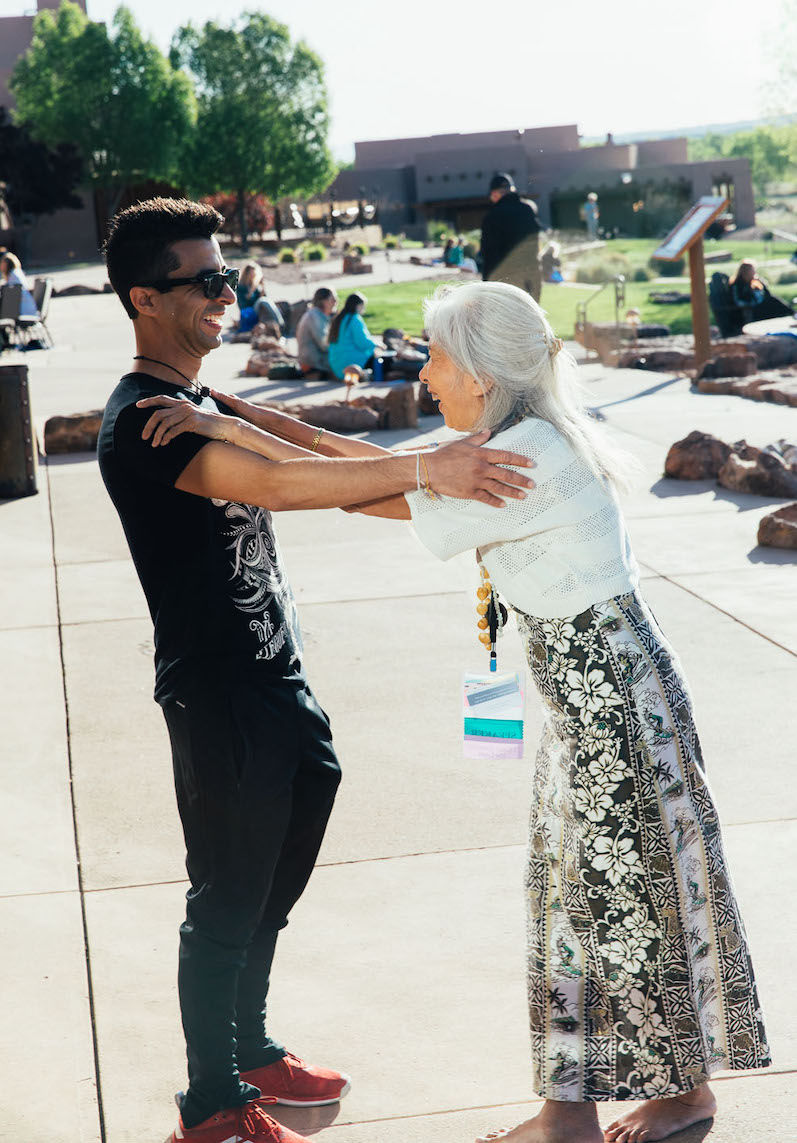
Pre- & Post-Conference Intensives
PRE-CONFERENCE
ONE-DAY TRAININGS
Thursday, May 29, 2025
8:30 am - 4:15 pm

P1. Think, Tap, Eat: An Integrative Approach to Chronic Pain Management
Fred Gallo and Sarette Zecharia
6 CE Hours**
Level: All

Chronic pain is a complex experience, shaped by physical, nutritional, cognitive, emotional, and social factors. This session offers a holistic approach to chronic pain management, integrating energy psychology, mindfulness, and nutrition within a biopsychosocial treatment framework. Join us to learn practical techniques through interactive discussions, demonstrations, and hands-on practice, equipping you with valuable tools to help manage and alleviate chronic pain.
Objectives
-
Describe 4 psychological models and treatments of chronic pain.
-
List medical treatments for chronic pain.
-
List 7 energy psychology/mindfulness techniques for treating chronic pain.
-
Identify 5 aspects of mindful eating.
-
List 5 nutrients that may assist in pain management.
-
Identify7 adaptogens that may assist in pain management.
Fred Gallo, PhD, DCEP. A pioneer in energy psychology and the creator of the term itself, Fred has been at the forefront of the field, training practitioners around the world. His publications include Energy Psychology, Energy Tapping for Trauma, and The Tapping Toolbox. With extensive experience in clinical application, Fred has certified thousands in his Advanced Energy Psychology.
Sarette Zecharia, PhD, DCEP, EHP-C, CIMHP. A certified energy psychology specialist and psychologist based in Arizona, Sarette integrates energy psychology with clinical qigong, Ayurveda, and nutrition to manage pain and mood disorders. Internationally recognized for her contributions to mainstreaming energy psychology in healthcare, she specializes in chronic pain, trauma, mood issues, and dreamwork.

P2. Embody Healing through the Chakras & Vagus Nerve: A Polyvagal-Informed Experience
Arielle Schwartz and Cheryl Llewelyn
6 CE Hours**
Level: All

This immersive workshop explores the transformative interplay between trauma, embodiment, and the chakra energy systems, with a focus on polyvagal theory. Learn how to stimulate the vagus nerve through targeted techniques, apply mindfulness, and engage in yoga practices that enhance resilience and support nervous system health. Leave with practical tools to deepen your clinical practice and foster healing through somatic awareness.
Objectives
-
Describe polyvagal theory.
-
Describe 2 ways to apply polyvagal theory to effect positive therapeutic outcomes.
-
Identify implicit/explicit messaging in self and clients through nervous system and chakras.
-
Demonstrate how to naturally stimulate the vagus nerve to enhance physical and emotional health.
-
Describe 2 benefits of awareness practices for mental and physical health.
-
List 2 benefits of yogic based breath and movement practices for mental and physical health.
Arielle Schwartz, PhD, is a licensed clinical psychologist and expert in complex trauma. She is a certified trauma professional, EMDR consultant, and Kripalu yoga teacher. Arielle is a renowned author and speaker, with eight books, including The Complex PTSD Workbook, EMDR Therapy and Somatic Psychology, and Applied Polyvagal Theory in Yoga.
Cheryl Llewelyn, MEd, LPC, NCC, is a polyvagal-informed therapist, and integrates somatic and neuroexperiential methods. She is trained in Internal Family Systems, Brainspotting, EMDR, and energy psychology. Cheryl's uses breathwork and subtle energy awareness to support trauma processing. Author of Chakras and the Vagus Nerve and Chakras, the Vagus Nerve and Your Soul, Cheryl blends neurobiology and spirituality.

P3. Weaving Accessible, Yet Powerful Medical Qigong into Your Practice
Roger Jahnke
6 CE Hours**
Level: Intermediate / Advanced
Unlock the power of Medical Qigong, an accessible yet profoundly effective energy psychology system. Learn how to seamlessly integrate short qigong protocols—ranging from just 10 seconds to 10 minutes—into client sessions, along with options for longer practices lasting 20 to 40 minutes. Perhaps more important, you will learn how to easily use Medical Qigong for yourself.
Objectives
-
Describe the roots of Medical Qigong in relation to Chinese medicine and philosophy.
-
Describe 3 findings from contemporary physiological research on Medical Qigong.
-
Perform 2 easy Medical Qigong methods synchronized to deep long slow breaths.
-
Identify 2 benefits of present moment focus and inner quiescence.
-
Describe how to use self-massage to direct the inner benefits of Medical Qigong to the parts of the body that need healing.
-
Describe how to use Medical Qigong sessions with your clients- both brief and extended versions.
Roger Jahnke, OMD, was among the first American doctors of Chinese medicine and energy medicine and brings decades of experience to the field. Author of Healer Within and Healing Promise of Qi, Roger is a lecturer, trainer, researcher and director of the Institute of Integral Qigong and Tai Chi. He is cofounder and past president of the National Qigong Association.

P4. Invisible Trauma: Overcoming the Hidden Wounds of Emotional Neglect with Energy Psychology
Kristin Holthuis
6 CE Hours**
Level: Intermediate / Advanced
Uncover the profound impact of emotional neglect and hidden trauma and learn how to support clients in recognizing and healing these often-overlooked wounds. Through energy psychology techniques, gain tools to identify and work with attachment wounds—especially avoidant attachment—enhancing rapport and fostering deeper healing in clients. This workshop offers transformative insights and practical approaches to elevate professional practice as well as personal growth.
Objectives
-
Identify your personal experience with emotional neglect and assess how it may influence your therapeutic approach with clients.
-
Describe 3 long-term psychological effects of emotional neglect.
-
List at least 3 characteristics of avoidant attachment style.
-
Identify 3 ways to improve rapport with clients with an avoidant attachment style.
-
Describe 3 ways to address emotional neglect in early childhood.
-
Describe a process to address being unwanted and rejected as a child, inspired by energy psychology modalities.
Kristin Holthuis, MD, DCEP, is a leader in integrating energy psychology with holistic care. She brings a wide range of expertise in EFT, TFT, TAT, TTT, CEP, and Logosynthesis. Kristin also incorporates flower essences, bio-decoding, and breathwork into her practice. She has introduced energy psychology and self-care programs in hospitals, international institutes, and various organizations, where she is recognized for her commitment to well-being.

P5. Energetic Resilience & Borrowing Benefits: Nurturing Healers Who Are at the Forefront
Holly Timberlake
6 CE Hours*
Level: Intermediate / Advanced
The work we love can also challenge our health and resilience. Energy psychology, celebrated for transforming clients' lives, can also help us sustain and enhance our own well-being. Discover powerful strategies to strengthen your "inner ship" for navigating rough waters and increase your life force. Gain tools to boost your resilience, prevent burnout, and maintain your vitality, leaving empowered to serve from a place of balance and strength.
Objectives
-
Describe the 5 main kinds of professional hazards for emotional healing providers.
-
List 3 societal dynamics that increase stress on practitioners
-
Describe "borrowing benefits" and how they might boost practitioner resilience
-
Demonstrate 3 self-techniques practitioners can use to reduce stress and charge during a session.
-
List the 4 elements of energy psychology work that can boost practitioner resilience and well-being.
-
List 4 benefits of increasing your awareness and practice of resilience during sessions.
Holly Timberlake, PhD, DCEP, is a licensed psychologist and specialist in developmental trauma. She focuses on helping individuals become resilient, empowered, and "ensouled" in their lives. Holly has presented widely on energy psychology and developmental trauma, unified field theory, and practitioner resilience. She is dedicated to guiding others through complex challenges with grounded tools and insights.

P6. HeartSpeak Level 1: Harnessing Interoception to Guide Healing
Anne Jensen
6 CE Hours*
Level: Intermediate / Advanced
Learn to use feelings – before they use you! A next-generation mindbody therapy, HeartSpeak uses cutting-edge research from affective and memory science. In this interactive workshop, you will improve your emotional flexibility while learning this powerful new technique. It can transform your practice – and your mind!
Objectives
-
List 3 traits of the feeling mind that distinguish it from the thinking mind.
-
List the steps of the HeartSpeak process (and the rational behind each step).
-
Describe how to apply the HeartSpeak process to either a physical symptom or a feeling symptom.
-
Demonstrate the application of HeartSpeak for Stress Reduction.
-
Describe how to evaluate emotional responses after a HeartSpeak intervention.
-
Describe how to incorporate HeartSpeak techniques in daily practice.
Anne Jensen, MSc, DPhil (PhD) is a forward-thinking mindbody specialist who earned her DPhil (PhD) from Oxford University, where she conducted research on the validity of muscle testing. Combining her expertise in psychology and chiropractic, her empathic ability and sense of curiosity, she developed HeartSpeak, a unique and empowering stress-reduction tool.
* Session is approved for different CE boards, but no CE for psychologists is available.
** Session is approved for CE for psychologists and and many other CE boards.
*** Session is approved for various CE boards, but not for psychologists and NBCC CE
POST-CONFERENCE
ONE-DAY TRAININGS
Monday, June 2, 2025
9:00 am - 5:00 pm

T1. The Power of Energy Psychotherapy & Human Design
Martha Delafield
No CE Hours
Level: All
Delve into the fascinating world of Human Design! This experiential workshop will guide you through the nine centers of Human Design, highlighting each center’s unique gifts and potential vulnerabilities. Using your own designs as a guide, we'll go through the centers. You'll engage in Emotional Freedom Techniques (EFT) to clear trauma and anchor gifts along the way. A powerful and potentially transformative process!
Objectives
-
Name 5 of the 9 centers in Human Design.
-
Describe the difference between Defined and Undefined centers.
-
Name 2 examples of how Human Design can help enhance your energy psychology practice.
-
List 3 “Types” in Human Design.
-
Describe a trauma associated with an undefined solar plexus.
-
Describe a trauma associated with and undefined sacral.
Martha Delafield, LCSW, has been weaving energy psychotherapy in her work for more than 30 years, and in the last 15 years has added Human Design and neurofeedback as additional powerful tools of transformation.

T2. Uncover & Transform Hidden Limiting Beliefs: A Four Step, Multidimensional Approach
Debra Greene
6 CE Hours* / ***
Level: All
In this immersive workshop, experience and learn a four-step protocol for finding hidden limiting beliefs, transforming them, and installing positive beliefs. Using higher-dimensional energies, this approach can promote profound and lasting effects for both you and your clients. Leave equipped with potent tools to elevate your healing practice and foster deep, enduring change.
Objectives
-
Name the 4 energy bodies.
-
Describe the role of beliefs in the Tillerian model.
-
List the steps of the four-step process.
-
Describe the role of consciousness in the Tillerian model.
-
Identify the 5 guidelines for potentized goal-setting.
-
Describe how to ethically employ the four-step protocol.
Debra Greene, PhD, is an innovator in energy medicine and energy psychology. Developer of Inner Clarity (IC), Debra is certified in numerous modalities, author of the acclaimed book, Endless Energy: The Essential Guide to Energy Health, and is trained in energy testing by faculty of the International Kinesiology College. Debra has lectured extensively, worked with thousands of clients, and taught hundreds of workshops.

T3. Timing & Techniques for Safely Integrating Energy Psychology into Trauma Treatment
Mary Sise
6 CE Hours**
Level: Intermediate / Advanced
We will begin with an overview of neurobiology and the four stages of trauma treatment. You will gain strategies to assess for dissociation, methods for client stabilization and strengthening, and step-by-step instructions for trauma processing. Includes video demonstrations of energy psychology techniques with a dissociative client, offering practical insights to enhance your trauma-informed practice.
Objectives
-
Describe how to evaluate and assess all patients to screen for dissociative phenomena and signs of multiple traumas.
-
List 2 strategies to demystify trauma to your patients and explain energy psychology methods based on current thinking regarding the neurobiology of trauma.
-
Identify 3 strategies to modulate affect and build competencies in the patient prior to any memory work.
-
Describe 2 strategies to process traumas in a contained way that minimizes abreaction and deterioration.
-
Identify 2 strategies to process trauma for patients with dissociated ego states.
-
Describe your scope of practice regarding trauma and when to refer.
Mary Sise, LCSW, DCEP, is a past president of ACEP and co-author of The Energy of Belief and author of Tapping the Panic out of Pandemic. An international speaker, she is on the faculty of the Shift Network and offers workshops and trainings in energy psychology and the sacred role of the healer. She is the program director for Sai Maa's Magdalena Healing Program, training healers around the globe.

T4. Explore & Experience the Ethics of Self-Care
Sherry O'Brian and Rachel Michaelsen
6 CE Hours** (NOTE: 6 ETHICS CE'S)
Level: All

Experience energy psychology, guided meditation, energy medicine exercises, and sound healing practices designed to mitigate cumulative stress and prevent compassion fatigue. This retreat also includes a review of ethical guidelines for maintaining healthy professional boundaries, with an emphasis on integrating self-care into clinical practice. A revitalizing experience for all practitioners committed to sustaining resilience and ethical excellence.
Objectives
-
List at least 3 reasons for boundaries in therapeutic relationships.
-
Describe at least 2 important differences between a boundary crossing and a boundary violation.
-
Describe at least 2 ways vicarious trauma impacts the nervous system.
-
Identify at least 2 signs or symptoms of vicarious traumatization, compassion fatigue or burn out.
-
Describe at least 3 techniques for completing the stress cycle on a daily basis.
-
Name at least 2 techniques developed to protect practitioners and client’s energetic boundaries.
Sherry O'Brian, LCSW, DCEP, is a psychotherapist who has assisted thousands of individuals within her workshops, groups, and private practice to transform their pain into possibility. She is certified in Comprehensive Energy Psychology, EFT, IET, Advanced Clinical Hypnotherapy, bereavement counseling, Psych-K and Guided Imagery.
Rachel Michaelsen LCSW, DCEP, has been a clinical social worker for 35 years. She has provided professional training in a range of topics from energy psychology to law and ethics. Rachel has taught the NY State required CE class for mental health providers on maintaining appropriate professional boundaries. She has a telehealth private practice and is a past chair of ACEP’s Humanitarian Committee.
* Session is approved for different CE boards, but no CE for psychologists is available.
** Session is approved for CE for psychologists and and many other CE boards.
*** Session is approved for various CE boards, but not for psychologists and NBCC CE.



